Unit_4_Politics__Class_and_Race
大学英语国家概况复习(名词解释+问答题)
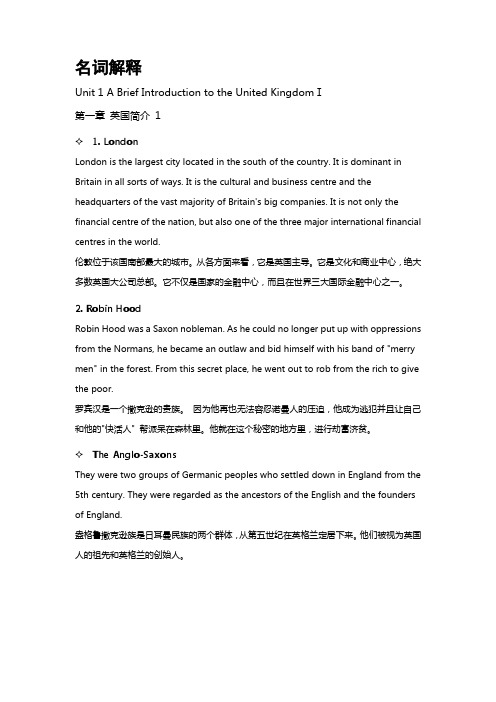
名词解释Unit 1 A Brief Introduction to the United KingdomⅠ第一章英国简介1✧ 1. LondonLondon is the largest city located in the south of the country. It is dominant in Britain in all sorts of ways. It is the cultural and business centre and the headquarters of the vast majority of Britain's big companies. It is not only the financial centre of the nation, but also one of the three major international financial centres in the world.伦敦位于该国南部最大的城市。
从各方面来看,它是英国主导。
它是文化和商业中心,绝大多数英国大公司总部。
它不仅是国家的金融中心,而且在世界三大国际金融中心之一。
2.Robin HoodRobin Hood was a Saxon nobleman. As he could no longer put up with oppressions from the Normans, he became an outlaw and bid himself with his band of "merry men" in the forest. From this secret place, he went out to rob from the rich to give the poor.罗宾汉是一个撒克逊的贵族。
因为他再也无法容忍诺曼人的压迫,他成为逃犯并且让自己和他的"快活人" 帮派呆在森林里。
2010年自考英语《英语国家概况》冲刺练习

Unit 1 A Brief Introduction to the United Kingdom 11、Britain is no longer an imperial country. T2、When people outside the UK talk about England,they mistake it as Britain sometimes. T3、The Socts and Welsh have a strong sense of being British. F4、Three of the following are characteristics of London.Which of the four is the Exception? CA London is a political,economic and cultural centre of the country.B London has a larger population than all other cities in England.C London is not only the largest city in Britain,but also the largest in the world.D London has played a significant role in the economic construction of the country.5、When did Scotland join the Union by agreement of the English and Scottish parliaments? DA In 1715B In 1688C In 1745D In 17076、The full name of the United kingdom is the United Kingdom of Great Britain and Northern Ireland.7、The island of Great Britain is made up of England,Scotland and Wales.8、The capital of Britain is London,which has great influence on the UK in all fields including government,finance,and culture.Unit 2 A Brief Introduction to the United Kingdom 21、Ireland is part of Great Britain. F2、Northern Ireland is significant because of its manufacturing industry. F3、Northern Ireland is the smallest of the four nations,but is quite well-known in the world for DA its most famous landmark,the “Giant’s Causeway”.B its rich cultural lifeC its low living standardsD its endless political problems4、Faced with conflicting demands the British government chose a compromise and organized a partition of Ireland in 1921,because BA the British government wouldn’t be able to control Ireland and longer by forceB the British government intended to satisfy both sides ——Catholics and ProtestantsC Catholics in Ireland demanded a partition of IrelandD Protestants welcomed the idea of partition5、The Home Rule Bill was finally passed in 1914,but the process was overtaken by the First World War and was suspended for the duration of the war.6、To pursue Irish independence,the most spectacular event in the Irish history was the Easter Rising of 1916,in which the rebels occupied Dublin’s Post Office and forced the British to take it back by military means.7、The Good Friday Agreement,known also as the Belfast Agreement ,emerged on 10 April 1998.8、The Good Friday Agreement assures the loyalist community that Northern Ireland “remains part of the United Kindom and shall not cease to be so without the consent of the majority of the people of Northern Ireland. 9、The Easter RisingIn order to gain independence,different Irish groups had been fighting against the British institutions and the British military forces.One such activity was the Easter Rising which took place in 1916.The rebels occupied Dublin’s Post Office and forced the British to bake it back by military force. The leaders of the rebellion were executed by the British authorities.10、Home RuleIreland had long been dominated by Britain,but Irish desire for an independent Irish state was never lost.”Home Rule” refers to a campaign for Irish control of Irish affairs.The Home Rule Bill was finally passed in 1914,but the process was overtaken by the Fist World War and was suspended for the duration of the was.11、The Good Friday AgreementAs a result of multi-party negotiations,the Good Friday Agreement was approved on 10 April 1998.This agreement assures the loyalist community that Northern Ireland remains part of the United Kingdom and it won’t change its political status unless the majority of the people of Northern Ireland agree.Under the terms of the agreement,Northern Ireland should be governed by three separate jurisdictions:that of the Republic of Ireland,that of Great Britain and that of its own elected executive government of ten ministers.Unit 3 The Government of the United Kingdom1、It is no doubt that British is the oldest representative democracy in the World. F2、The oldest institution of government in Britain is the Monarchy. T3、The divine right of the King means the sovereign derived his authority from his subjects. F4、Which of the following is NOT a characteristic of British government. AA It offers the Queen high political status and supreme power.B It is both a parliamentary democracy and a constitutional monarchy.C It is the oldest representative democracy in the world.D It has no written from of constitution.5、Which of the following is NOT related to the Constitution? AA It is a written document which lists out the basic principles for government.B It is the foundation of British governance tody.C Conventions and Laws passed by Parliament are part of the Constitution.D The common laws are part of the Constitution.6、Which of the following statements is NOT correct? DA There are no legal restraints upon Parliament.B Strictly speaking,the Queen is part of the Parliament.C Parliament has the supreme power of passing laws.D Parliament has no power to change the terms of the Constitution.7、Which of the following is NOT a true description of the Queen’s role? AA The Queen selects the Prime Minister and the Cabinet.B The Queen symbolizes the tradition and unity of the British state.C The Queen acts as a confidante to the Prime Minister.D The Queen is the temporal head of the Church of England.8、The British Constitution consists of statute law,common law and conventions.9、Strictly speaking,the Parliament today consists of the Queen,the House of Lords and the House of Commons.10、The House of Commons.It is the real center of British political life because it is the place where about 650 elected representatives (Members of Parliament) make and debate policy.These MPs are elected in the General Elections and should represent the interests of the people who vote for them.Unit 4 Politics,Class and RACE1、In the UK,a government cannot stand for longer than five years except in exceptional circumstances. T2、Children from the upper-middle-class usually have a better education than those from the working or middle-class. T (老师讲题时为T ,书后答案为 F)3、Which of the following description about the Conservative party is NOT true? DA It has been in power for an unusually long period of time.B It prefers policies that protect individual’s rights.C It receives a lot of the funding form big companies.D It is known as a party of high taxation levels.4、Which of the following statements is NOT true about class system in the UK? BA People of different classes tend to read different kinds of newspapers.B Class division is only decided by people’s income.C Though social advancement is possible,class affects a person’s life chances.D The way people speak may identify them as belonging to a particular class.5、Normally,a government can be in power for 5 years,and then it has to resign and hold a general election.6、There are three major parties in the UK : the Conservative party,the Labour party and t he Liberal Democratic party.7、From 1979 to 1997,the Conservative party won 4 consecutive elections and was in power for quite a long time.Unit 5 The UK Economy1、By the 1880’s the British economy was dominant in the world. T2、Both the US and Canada overtook British in economy by 1990. F3、Another reason for British decline is the loss of its colonies,especially India,which gained its independence in 1947. T4、Which of the following statements is NOT true about the UK economy? CA Britain remains one of the Group of Seven large industrial economies.B Britain has experienced a relative economic decline since 1945.C There has been a period of steady decreasing of living standards.D Some smaller economies have overtaken the UK in terms of output per capita.5、”The Jewel in the Crown” of the British Empire India, which provided raw materials and a big market for British goods,gained independence in 1947.6、Since 1945,the UK economy has experienced relative decline rather than absolute decline.7、In 1979,the Conservative party under Margaret Thatcher came into power and carried out a programme of reform.8、Relative decline of the UK economy.The UK has experienced an economic decline since 1945.But this is a relative decline rather than an absolute one .British is wealthier and more productive than it was in 1945,but since other countries developed more rapidly,it has slid from being the second largest economy to being the sixth.Unit 6 British Literature1、Thomas Hardy,the author of Tess of the D’Urbervilles,was also a first-class poet. T2、Which of the following books is written by Geoffrey Chaucer? AA The Canterbury TalesB BeowulfC King LearD Morte D’Arthur3、Which of the following did NOT belong to Romanticism? DA Keats .B ShelleyC WordsworthD Defoe4、Which of the following writers was the most famous Scottish novelist? DA wrenceB Charles DickensC Jonathan SwiftD Sir Walter Scott5、The Canterbury TalesThe Canterbury Tales written by Geoffrey Chaucer is the most important work in Middle English literature.It is made up of a series of stories told by 31 pilgrims to entertain each other on their way to the Christian Church at Canterbury in southeast England.It’s quite noticeable for its diversity,not only in range of social status among the pilgrims,but also in style or the stories they tell.Unit 7 British Education System1、The purpose of British education is not only to provide children with literacy and the other basic skills but also to socialize children. T2、Public schools are part of the national education system and funded by the government. F3、In Britain,the great majority of parents send their children to CA private schoolsB independent schoolsC state schoolsD public schools4、In Britain,children from the age of 5 to 16 BA can legally receive partly free aducationB can legally receive completely free educationC can not receive free education at allD can not receive free education if their parents are rich5、Which of the following is NOT true about the British education system? DA It’s run by the stateB It’s funded by the stateC It’s supervised by the stateD It’s dominated by the state6、Childern in Britain must receive a full-time education legally from the age of 5 to 16.7、Pupils from the age of 5 to 11 mainly attend state-run primary schools.Unit 8 British Foreign Relations1、Which countries are the permanent members of the UN Security Council? CC China,Russia,France,Britain and the United States.2、Nowadays the British foreign policy is largely shaped by its participation in CC the United Nations,the EU,NATO,etc3、When the Second World War was over,Britain was active in setting up the United Nations and became one of the five permanent members of the UN Security Council.4、The present foreign policy of Britain is greatly influenced by its imperial history and also by its geopolitical traits.5、Britain’s special relationship which the United States is another major factor which influences the British foreign policy.6、The general direction of Britain’s foreign policy is decided by the Prime Minister and Cabinet .。
英语国家文化与社会文化入门unit4 Politics, Class and Race

General Elections
• • • • Why are They Important? When Do Elections Occur? Who Can Stand for Election as an MP? What Happens in an Election? (How)
The Conservative Party
① the party of the individual. ② a “fatherly” sense of obligation to the less fortunate in society. ③ The difference is one of degree, not an absolute.
Class
③Class-divisions are not simply economic, they are cultural as well. People of different classes may differ in the kind of newspapers they read, in the way they speak and in the kind of education they receive.
2. A government has been in power for 5 years. And there will be a general election every five years. A.longer than 5 years a) exceptions during WWI and WWII B. sooner than 5 years a)vote of no confidence b)the Prime Minister---popular
Unit 4 Politics_ Class and Race (英国的政治_阶级和种族)
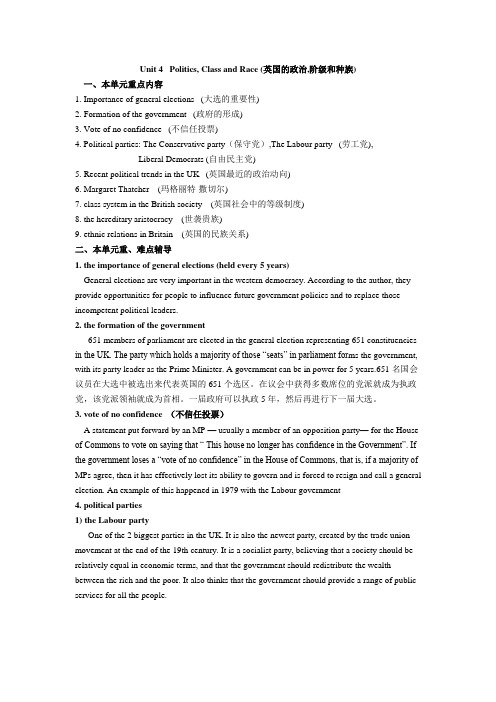
Unit 4 Politics, Class and Race (英国的政治,阶级和种族)一、本单元重点内容1. Importance of general elections (大选的重要性)2. Formation of the government (政府的形成)3. Vote of no confidence (不信任投票)4. Political parties: The Conservative party(保守党),The Labour party (劳工党),Liberal Democrats (自由民主党)5. Recent political trends in the UK (英国最近的政治动向)6. Margaret Thatcher (玛格丽特·撒切尔)7. class system in the British society (英国社会中的等级制度)8. the hereditary aristocracy (世袭贵族)9. ethnic relations in Britain (英国的民族关系)二、本单元重、难点辅导1. the importance of general elections (held every 5 years)General elections are very important in the western democracy. According to the author, they provide opportunities for people to influence future government policies and to replace those incompetent political leaders.2. the formation of the government651 members of parliament are elected in the general election representing 651 constituencies in the UK. The party which holds a majority of those “seats” in parliament for ms the government, with its party leader as the Prime Minister. A government can be in power for 5 years.651名国会议员在大选中被选出来代表英国的651个选区。
英语国家概况(1)课程第1次形成性考核答案与讲评
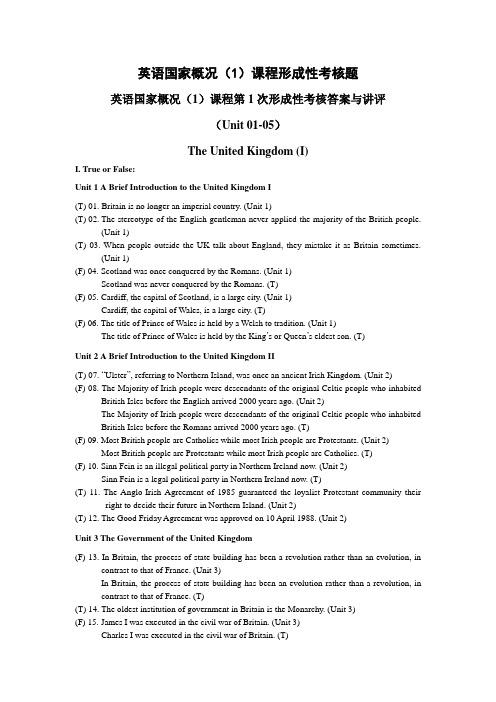
英语国家概况(1)课程形成性考核题英语国家概况(1)课程第1次形成性考核答案与讲评(Unit 01-05)The United Kingdom (I)I. T rue or False:Unit 1 A Brief Introduction to the United Kingdom I(T) 01. Britain is no longer an imperial country. (Unit 1)(T) 02. The stereotype of the English gentleman never applied the majority of the British people.(Unit 1)(T) 03. When people outside the UK talk about England, they mistake it as Britain sometimes.(Unit 1)(F) 04. Scotland was once conquered by the Romans. (Unit 1)Scotland was never conquered by the Romans. (T)(F) 05. Cardiff, the capital of Scotland, is a large city. (Unit 1)Cardiff, the capital of Wales, is a large city. (T)(F) 06. The title of Prince of Wales is held by a Welsh to tradition. (Unit 1)The title of Prince of Wales is held by the King’s or Queen’s eldest son. (T)Unit 2 A Brief Introduction to the United Kingdom II(T) 07. “Ulster”, referring to Northern Island, was once an ancient Irish Kingdom. (Unit 2)(F) 08. The Majority of Irish people were descendants of the original Celtic people who inhabitedBritish Isles before the English arrived 2000 years ago. (Unit 2)The Majority of Irish people were descendants of the original Celtic people who inhabited British Isles before the Romans arrived 2000 years ago. (T)(F) 09. Most British people are Catholics while most Irish people are Protestants. (Unit 2)Most British people are Protestants while most Irish people are Catholics. (T)(F) 10. Sinn Fein is an illegal political party in Northern Ireland now. (Unit 2)Sinn Fein is a legal political party in Northern Ireland now. (T)(T) 11. The Anglo-Irish Agreement of 1985 guaranteed the loyalist Protestant community their right to decide their future in Northern Island. (Unit 2)(T) 12. The Good Friday Agreement was approved on 10 April 1988. (Unit 2)Unit 3 The Government of the United Kingdom(F) 13. In Britain, the process of state-building has been a revolution rather than an evolution, incontrast to that of France. (Unit 3)In Britain, the process of state-building has been an evolution rather than a revolution, in contrast to that of France. (T)(T) 14. The oldest institution of government in Britain is the Monarchy. (Unit 3)(F) 15. James I was executed in the civil war of Britain. (Unit 3)Charles I was executed in the civil war of Britain. (T)(T) 16. Britain is both a parliamentary democracy and a constitutional monarchy. (Unit 3)(F) 17. Members of Parliament elect the Prime Minister and the Prime Minister appoints theCabinet. (Unit 3)Members of Parliament elect the Prime Minister and the Cabinet. (T)(T) 18. Common laws are laws which have been established through common practice in the courts. (Unit 3)Unit 4 Politics, Class and Race(T) 19. In the UK, a government cannot stand for longer than five years except in exceptional circumstances. (Unit 4)(T) 20. Anyone who is eligible to vote with 500 pounds as deposit can stand as an MP. (Unit 4) (F) 21. The amount of spent in national campaign is not limited as well as that on TV. (Unit 4)The amount of spent in national campaign is not limited other than that on TV. (T)(T) 22. Children from upper-middle class usually have a better education than those from the working class or middle class. (Unit 4)(F) 23. The majority of middle-class people today have upper-class parents or grandparents. (Unit4)The majority of middle-class people today have working-class parents or grandparents. (T) (F) 24. Most immigrants earn a living by opening restaurants or becoming writers or musicians.(Unit 4)Some immigrants earn a living by opening restaurants or becoming writers or musicians.(T)Unit 5 The UK Economy(T) 25. By the 1880s, the British economy was dominant in the world. (Unit 5)(F) 26. Both the U.S. and Canada overtook Britain in economy by 1900. (Unit 5)Only the U.S. overtook Britain in economy by 1900. (T)(T) 27. Another reason for British decline is the loss of its colonies, especially India, which gained its independence in 1947. (Unit 5)(T) 28. In the 1970s, with the soaring price of oil and high rate of inflation, Britain went through a bad period. (Unit 5)(F) 29. The secondary industry produces approximately two-thirds of the national wealth. (Unit 5)The tertiary industry produces approximately two-thirds of the national wealth. (T)(T) 30. The service industry in the UK employs 70% of the total work force. (Unit 5)II. Choose the best answer:Unit 1 A Brief Introduction to the United Kingdom I01. Which of the following is NOT considered a characteristic of London? (Unit 1) Key DA. The cultural centre.B. The business centre.C. The financial centre.D. The football centre.02. Which of the following is NOT true about the characteristic of Britain? (Unit 1) Key BA. Economic differences between north and south.B. Difference of social systems between Scotland and Wales.C. Class differences between a white-collar worker and a blue-collar worker.D. Cultural differences between immigrants and the British.03. Which of the following can NOT be found in London? (Unit 1) Key AA. Teahouses.B. Art galleries.C. Museums.D. Theatres.04. Which is the largest city in Scotland? (Unit 1) Key CA. Cardiff.B. Edinburgh.C. Glasgow.D. Manchester.05. Which of the following statements is NOT true? (Unit 1) Key BA. Wales was invaded by the Romans.B. Wales was occupied by the Anglo-Saxons.C. Wales was conquered by the Normans.D. Wales was threatened by the English.06. When did Scotland join the Union by agreement of the English and Scottish parliament?(Unit 1) Key BA. In 1688.B. In 1707.C. In 1715.D. In 1745.Unit 2 A Brief Introduction to the United Kingdom II07. In the 17th century, the English government encouraged people from Scotland and NorthernEngland to emigrate to the north of Ireland because ______. (Unit 2) Key AA. they wanted to increase its control over IrelandB. they had too many people and didn’t have enough space for them to live in BritainC. they intended to expand their investmentD. they believed that Ireland was the best place for them08. Northern Ireland is the smallest of the four nations, but is quite well-known in the world for______. (Unit 2) Key DA. its most famous landmark, the “Giant’s Causeway”B. its rich cultural lifeC. its low living standardD. its endless political problems09. Faced with conflicting demands, the British government chose a compromise and organised apartition of Ireland in 1921 because ______. (Unit 2) Key BA. the British government wouldn’t be able to control Ireland any longer by forceB. the British government intended to satisfy both sides—Catholics and ProtestantsC. Catholics in Ireland demanded a partition of IrelandD. Protestants welcomed the idea of partition10. Why did the British government decide to replace the power-sharing policy with “direct-rule”from London? (Unit 2) Key DA. The power-sharing policy was not accepted by the majority of Protestants.B. The Northern Irish Parliament could not govern the power effectively.C. The Power-sharing policy couldn’t be carried out.D. All the above.11. Which of the following agreements is accepted by both Catholics and Protestants in NorthernIreland? (Unit 2) Key CA. The Anglo-Irish AgreementB. The Belfast AgreementC. The Good Friday AgreementD. The Multi-Party Agreement12. According to the Good Friday Agreement, Northern Ireland today should be governed by thefollowing jurisdictions except ______. (Unit 2) Key BA. the jurisdiction of the Republic of IrelandB. the jurisdiction of loyalist ministersC. the jurisdiction of Great BritainD. the jurisdiction of Northern IrelandUnit 3 The Government of the United Kingdom13. Which of the following is NOT a characteristic of British government? (Unit 3) Key AA. It offers the Queen high political status and supreme power.B. It is both a parliamentary democracy and a constitutional monarchy.C. It is the oldest representative democracy in the world.D. It has no written form of Constitution.14. What happened in 1215? (Unit 3) Key BA. It was the year of Norman Conquest in British history.B. Forced by barons, King John signed the Magna Carta.C. Henry IV granted the Commons the power to review money grants.D. King Egbert united England under his rule.15. Under whose reign was the Bill of Rights passed? (Unit 3) Key BA. James II.B. William of Orange.C. Oliver Cromwell.D. George I.16. Which of the following in NOT related to the Constitution? (Unit 3) Key AA. It is a written document which lists out the basic principles for government.B. It is the foundation of British government today.C. Conventions and laws passed by Parliament are part of the Constitution.D. The common laws are part of the constitution.17. Which of the following is NOT a true description of the Queen’s role? (Unit 3) Key AA. The Queen selects the Prime Minister and the Cabinet.B. The Queen symbolises the tradition and unity of the United Kingdom.C. The Queen acts as a confidante to the Prime Minister.D. The Queen is the temporal head of the Church of England.18. Which of the following is NOT a feature of the House of Lords? (Unit 3) Key CA. Lords do not receive salaries and many do not attend Parliament sittings.B. It consists of the Lords Spiritual and the Lords Temporal.C. The lords are expected to represent the interests of the public.D. Most of the lords in the House of Lords are males.Unit 4 Politics, Class and Race19. Which group of people cannot vote in the General Election? (Unit 4) Key BA. Members in the House of Commons.B. Lords in the House of Lords.C. The UK citizens above the age of 18.D. The UK resident citizens of the Irish Republic.20. By whom is a “vote of no confidence” decided? (Unit 4) Key AA. The House of Commons.B. The House of Lords.C. The two major parties.D. The Prime Minister.21. Which of the following is NOT true about the electoral campaign? (Unit 4) Key AA. Big parties can buy time to broadcast their policies on the television.B. There is a limit on the amount of money candidates can spend in their campaign.C. Candidates and their supporters go door-to-door persuading voters to vote for them.D. Candidates criticise each other’s policies to show how good their policies are.22. How many seats in the House of Commons should a party hold at least in order to win theelection? (Unit 4) Key AA. 326B. 351C. 626D. 65023. Which of the following statements is NOT true about class system in the UK? (Unit 4)Key BA. People of different classes tend to read different kinds of newspapers.B. Class division is only decided by people’s income.C. Though social advancement is possible, class affects a person’s life chances.D. The way people speak may identify them as belonging to a particular class.24. Which of the following is NOT an effect of immigration on British society? (Unit 4)Key BA. There is now a varied cuisine for people to choose from.B. Class tension has increased.C. New forms of popular music have emerged.D. Different religious beliefs have been practices actively.Unit 5 The UK Economy25. Which of the following statements is NOT true about the UK economy? (Unit 5) Key CA. Britain remained one of the Group of Seven large industrial economies.B. Britain has experienced a relative economic decline since 1945.C. There has been a period of steady decreasing of living standards.D. Some smaller economies have overtaken the UK in terms of output per capita.26. Which of the following livestock has the biggest number in the UK? (Unit 5) Key DA. Beef cattle.B. Dairy cattle.C. Chicken.D. Sheep.27. Where is the best agricultural land in Britain? (Unit 5) Key AA. In the southeast of England.B. In the northeast of England.C. In the southeast of Scotland.D. In the northeast of Scotland.28. In the aerospace industry, which two countries are ahead of Britain? (Unit 5) Key BA. The U.S. and Germany.B. The U.S. and Russia.C. Germany and Russia.D. France and Germany.29. Which civil airline was started in 1924 after the First World War? (Unit 5) Key AA. Imperial Airways.B. British Airways.C. Hawker-Siddeley Corporation.D. The British Aircraft Corporation.30. Which of the following two companies merged into British Aerospace? (Unit 5) Key AA. The British Aircraft Corporation and Hawker-Siddeley A viationB. The British Aircraft Corporation and Rolls Royce.C. Hawker-Siddeley A viation and GEC A vionics.D. Hawker-Siddeley A viation and Rolls Royce.III. E xplain the following terms:Unit 1 A Brief Introduction to the United Kingdom I01. Anglo-Saxons (Unit 1)They were two groups of Germanic people who settled down in England from the 5th century. They were regarded as the ancestors of the English and the founders of England.02. King Harold (Unit 1)He was the Saxon King whose army was defeated in the Battle of Hastings in 1066, when William the Conqueror invaded England from France.Unit 2 A Brief Introduction to the United Kingdom II03. The Provisional IRA (Unit 2)In 1919, a group calling itself the IRA (Irish Republic Army) expanded fighting for the Irishfreedom and independence. The Provisional IRA is the radical faction of the IRA. They prefer the use of force and believe that armed force is the only way to get the British out and to have a unified Ireland.04. The Good Friday Agreement (Unit 2)As a result of multi-party negotiation, the Good Friday Agreement was approved on 10 April, 1998. This agreement assures the loyalist community that Northern Ireland remains part of the United Kingdom and it won’t change its political status unless the majority of the people of Northern Ireland agree. Under the terms of agreement, Northern Ireland should be governed by three separate jurisdictions: that of the Republic of Ireland, that of Great Britain and that of its own elected executive government of ten ministers.Unit 3 The Government of the United Kingdom05. The Bill of Rights of 1689 (Unit 3)In 1688, King James II’s daughter Mary and her husband William were invited by the politicians and church authorities to take the throne, on condition that they would respect the rights of Parliament. The Bill of Rights was passed in 1689 to ensure that the King would never be able to ignore Parliament.06. The functions of Parliament (Unit 3)The functions of Parliament are: to pass laws, to vote for taxation, to scrutinise government policy, administration and expenditure and to debate the major issues of the day.07. The House of Lords (Unit 3)The house of Lords consists of the Lords Spiritual, who are the Archbishops and most prominent bishops of the Church of England, and the Lords Temporal, which refers to those lords who either have inherited the seat from their forefathers or they have been appointed. The lords mainly represent themselves instead of the interests of the public.08. The House of Commons (Unit 3)The House of Commons is the real centre of British political life because it is the place where about 650 elected representatives (Members of Parliament) make and debate policy. These MPs are elected in the General Election and should represent the interest of the people who vote for them.Unit 4 Politics, Class and Race09. The importance of general elections (Unit 4)General elections are very important in western democracy. According to Unit 4, they provide opportunities for people to influence future government policies and to replace those incompetent political leaders.10. The formation of the British government (Unit 4)Before a general election, the political parties would start their electoral campaign in order to make their ideologies and policies known to the public. The campaign involves advertisements in newspapers, door-to-door campaigning, postal deliveries of leaflets and “party electoral broadcasts” on the television. The parties also try to attack and criticise the opponents’ policies. Therefore, these campaigns sometimes can be quite aggressive and critical.Unit 5 The UK Economy (Unit 5)11. Privatisation in 1980s (Unit 5)The British economy went through a particular bad period in the 1970s, with high rate of inflation and devaluation of the Pound. Therefore, in the 1980s, when the Conservative party under Margret Thatcher was in power, an extensive programme of privatisation was carried out. Many state-owned businesses (such as steel, telecom, gas, and aerospace) were turned into private companies. Privatisation was successful in controlling inflation but at the same time unemployment rate increased rapidly.12. Main sectors of the UK economy (Unit 5)The UK national economy can be divided into three main areas: primary industries, such as agriculture, fishing and mining; secondary industries which manufacture complex goods from those primary products; tertiary (or service) industries such as banking, insurance, tourism and the retailing.。
Unit 4
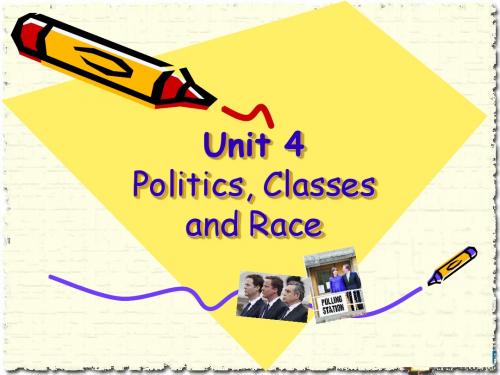
Politics
What you should know:
• • • • General Elections The Political Parties Recent Political Trends Current Issues
Unit 4 politics classes and race
Unit 4 politics classes and race
General Elections
• What happens in an Election
– On the election day the voters:
• • • • People go to local voting stations Check their identity Cross (X) the chosen candidates in private booth Cast the votes into the ballot box
– The counting under close supervision – The results come out in a few hours – The political party that win over half of constituencies form the government. the party leader becomes the new Prime Minister
General Elections
• the Importance of General Elections
– right to vote is gained through struggle – 5%(1832)---25%(1884)---75%(1919)---99% (1928)
英语国家社会与文化入门unit 4-5(课堂PPT)

IV. Race
26
Unit 5
The UK Economy
27
Key points
▪ I. Events in History 1. Dominant in the 1880s 2. Overtaken in 1900 3. Decline since 1945 4. Privatization in the 1980s ▪ II. The current UK economy 1. Primary industry 2. Secondary industry 3. Tertiary industry
13
II. The policital Parties
▪ 1. The Labour Party
14
II. The policital Parties
▪ 1. The Labour Party
15
II. The policital Parties
▪ 2. The Conservative Party
6
I. General elections
7
I. General elections
▪ 4. what happens in an election
8
I. General elections
▪ 4. what happens in an election
9
I. General elections
37
II. The current UK economy
38
II. The current UK economy
ห้องสมุดไป่ตู้39
II. The current UK economy
英美文化概论提纲

英美文化概论提纲Unit 1 a brief introduction to the united kingdom 1一 a brief introduction1.全称 The United Kingdom of Great Britain and northern Ireland--P17 III 12.构成England LondonScotland EdinburghWales CardiffNothern Ireland Belfast--P17 III23.历史A公元43世纪RomanB公元7世纪Anglo –saxons 安格鲁撒克逊人C 8世纪末阿尔弗雷德大帝King Alfred北欧海盗D 1066年诺曼征服NormansWilliam of NormandyBattle of HastingsKing Harold4.英国内战 civil war 资产阶级革命二Scotland1. Glasgow 最大城市 --P16 II 82. 大学15世纪 ancient and international university --P17 III 11三WalesUnlike England it did not fall to the Anglo-Saxon invaders of the 5th century --P16 II 11名词解释London:the largest city located in the south of the country .London is dominant in the UK in all fields;government finance and culture.London is one of the top three financial centers in the worldUnit 2 a brief introduction to the united kingdom iiNorthern Ireland1.宗教爱尔兰人是天主教徒 Catholics英国人是新教徒 Protestants--P33 I 62.1921年独立 Irish State (分水岭)3.爱尔兰南部26郡成立自由邦北部6 郡仍属英国—P34 II 104 .Loyalist 民族派希望加入爱尔兰共和国Unionist 联合派亲英国5.The official IRA 倾向于政治手段解决–P34 III 4The Provisional IRA 军事–P35 III 5“The Bullet and the Ballot Box”—P35 III 106.区分 Sinn Fein是政党 --P33 I 8/P35 III 11,121919 IRA是军事团体非政党7 .1973年 Power-Sharing mechanism权利分享机制—P34 II 88.1972 “Bloody Sunday”—P34 II 79.1985 Anglo-Irish agreement --P33 I 910. Downing –Street Declaration唐宁街宣言授权英军司令直接干预北爱治安事务名词解释1.”Home-rule”:1914年被签署成为法律。
英语国家社会与文化学习重点
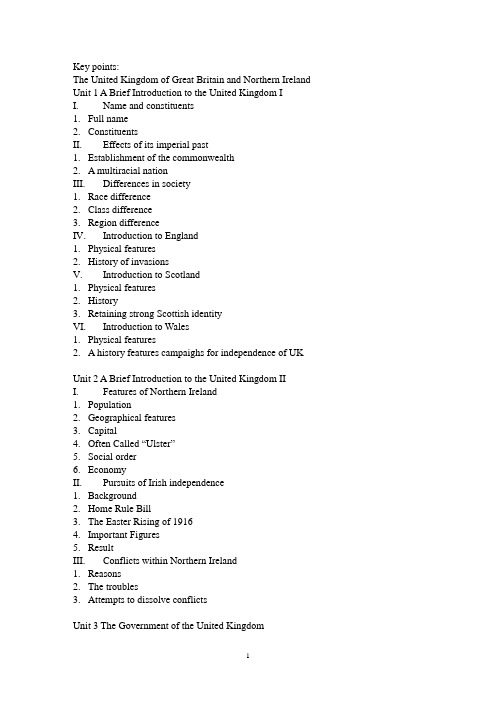
Key points:The United Kingdom of Great Britain and Northern Ireland Unit 1 A Brief Introduction to the United Kingdom I and constituents1.Full name2.ConstituentsII.Effects of its imperial past1.Establishment of the commonwealth2. A multiracial nationIII.Differences in society1.Race difference2.Class difference3.Region differenceIV.Introduction to England1.Physical features2.History of invasionsV.Introduction to Scotland1.Physical features2.History3.Retaining strong Scottish identityVI.Introduction to Wales1.Physical features2. A history features campaighs for independence of UK Unit 2 A Brief Introduction to the United Kingdom III.Features of Northern Ireland1.Population2.Geographical features3.Capital4.Often Called “Ulster”5.Social order6.EconomyII.Pursuits of Irish independence1.Background2.Home Rule Bill3.The Easter Rising of 19164.Important Figures5.ResultIII.Conflicts within Northern Ireland1.Reasons2.The troubles3.Attempts to dissolve conflictsUnit 3 The Government of the United KingdomI.Monarchy in history1.Origin2.Divine right of the King3.One short ousted period4.Magna CartaII.The history of Parliament1.Origin2.History3.Acquisition of powerIII.The birth of the Prime Minister and Cabinet1.Birth of Cabinet2.Birth of Prime MinisterIV.The British government and Constitutionernment system2.The ConstitutionV.Parliament Today1.Functions2.Status3.InstitutionsUnit 4 Politics, Class and RaceI.General elections1.Why are they important?2.When do elections occur?3.Who can stand for election as an MP?4.What happens in an election?5.Formation of governmentII.The political Parties1.The Labour party2.The Conservative Party3.The Liberal DemocratsIII.Class1.Class-divisions2.Cultural differences3. A distinctive features of British class-system IV.Race1. A multiracial nation2.Influences of immigrationUnit 5 The UK EconomyI.Events in History1.Dominant in the 1880s2.Overtaken in 19003.Declince since 19454.Privatization in the 1980sII.The current UK economy1.Primary industry2.Secondary industries3.Tertiary industriesIII.Case study: the aerospace industry1.Status2.Major achievements3.Recent changesUnit 6 British LiteratureI.Early Writing1.Theme2.Beowulf3.Canterbury Tales4.The legend of King ArthurII.The 15th and 16th centuries1.Elizabethan Drama2.Christopher Marlowe3.William ShakespeareIII.The 17th century1.King James Bible2.Francis Bacon3.John MiltonIV.The 18th century1.Features2.Johnathan Swift3.Robert Burns4.Daniel DefoeV.The 19th century1.Romanticism2.Poetry3.NovelVI.The 20th century1.Modernism2.Postmodernism3.Joseph Conrad4.Virginia Woolf5. D.H. Lawrence6. E.M.FosterUnit 7 English Education SystemI.Purpose of Education1.To teach “the three R’s”2.To socialize childrenII.The relationship between education and social class1.Inequality in British education2.Good Education Guarantees a careerIII.The influence of the Church on schooling1.In the past2.At present3.ChangesIV.Major changes to British education system1.Involvement of government2.The 1994 Education Act3.Introduction of comprehensive schools4.“The Great Education Debate”5.National Curriculum in 1989V.The present education systemcation in the UK is compulsory2.State sector and private sector schools3.Schooling stages and examsVI.Higher education1.Fund2.Founding Time3.Open university4.Degree titlesUnit 8 British Foreign RelationsI.Britain then and now1.The end of British Empire2.Britain todayII.The foundations of Britain’s Foreign Policy1.Imperial history2.Geoplitical traitsIII.How foreign policy is made?1.The Prime Minister and Cabinet2.The Foreign and Commonwealth Office (FCO)3.The Ministry of Defense4.The Department of Trade and Industry5.The treasury6.Electorate7.Foreign relationsIV.Britain and international institutions1.A member of UN Security Council (UNSE)2. A member of European Union (EU)3. A member of CommonwealthV.Britain and the United States1.Special Relationship2.Ups and downsVI.Britain security and defense1.Britain’s defense power2.Britain’s defense policyUnit 9 The British MediaI.Popularity2.Newspapers3.RadioII.FunctionsIII.Newspapers1.Long history2.The role of newspapers3.Freedom of press4.National papersIV.The broadcast media (TV and Radio)1.Why is TV popular?2.British IV culture3.The British Broadcasting Corporation (BBC) Unit 10 Sports, Holidays and Festivals in BritainI.Sports1.Football2.Tennis3.Cricket4.Golf5.Horsy sportsII.Religious holidays1.Christmas2.Easter3.RamadanIII.National holidays1.The Queen’s birthdayIV.Holidays in England1.Bonfire Night (Guy Fawkes Night)V.Holidays in Northern Ireland1.The Orange March2.St Patrick’s DayVI.Holidays in Scotland1.Hogmanay2.The Burns Night3.HalloweenVII.Holidays in WalesVIII. 1.EistenddfodIrelandUnit 11 Land, People and HistoryI. The island of Ireland1.Location2.ConstituentsII. Geographynd2.Climate3.EnvironmentIII. Population1.Features2.The Great Famine3.EmigrationsIV. History1.The Celts2.The coming of Christianity3.Viking invasion4.English invasion5.Irish independenceUnit 12 Politics and EconomyI. Political system1.A representative democracy2.A RepublicII. Structure of Irish government1.President2.The Government3.ParliamentIII.The electoral system1.V oting in elections and referenda2.Electorate3.Proportional representationIV. The Civil service1.Neutrality2.Structure3.SelectionV. The Irish legal system1.The hierarchy of the Irish legal system2. Judges3. Check and balanceVI. Transformation of Irish economy1.In the past2.At present3.ReasonsVII.Ireland’s accession to the EU1.Economic benefits2.Social changesVIII.Ireland today1.Home-ownership2.Transportation3.Living standardsUnit 13 Irish Culture: How the Irish Live NowI.Rapid social change1.Abolition of primogeniture2.Change of women’s lifestyle3.Dislocations of social wealthII.Differnces between Ireland and English1.Religionnguage3.Economy4.OpennessIII.Attitudes towards English1.Ambivalence2.Stereotypes from the EnglishIV.The Roman Catholic Church1.The Roman Catholic values2.The power of Roman Catholic Church3.Lose of power4.The difference between Catholics and Protestants V.The Family1.Changes in family life2.Reason for the changes3.Objectives of women’s movementVI.Pub culture1.What is a “pub”?2.Negative EffectVII.Work culture1.Work practices2.Trade Unionscation1.First-level schools2.Second-level schools3.V ocational schools4.Third-level educationUnit 14 Irish Culture: Language, Literature and Artsnguage1.Irish under political unrests2.Hiberno-EnglishII.Oral culture1.Features2.Origin3.Positive effectsIII.Literature1.The first Irish poem2.Nobel Prize winners for Literature3.Other important figuresIV.Music and Dance1.The Irish pipe2.Riverdance3.Irish harpV.Sports culture1.Soccer (football)2.Rugby football3.Cricket and tennis4.Hurling5.Golf6.Horse-racingVI.Science and Technology1.Distinguished figures2.Important societiesVII.The Irish identity in the world1.The Irish diaspora2.Attitudes towards other countriesAustraliaUnit 15 The Land and the People of the DreamingI.Natural of Features of the land1.Location2.Size3.Constituents4.Distinctive faunandscape6.Distinctive physical featuresII.The people1.The indigenous people2.The later settlersIII.Dreamtime and Dreaming1.What is “Dreamtime”?2.What is “the Dreaming”?IV.British colonization1.Terra Nullius2.Exploitation of the land3.The impact of colonization4.The policies of segregation and exclusion5.The policy of AssimilationUnit 16 Australia Culture LifeI.Protestantism1.Status2.Values3.Protestantism and CapitalismII.Anglicanism1.Status2.DeclineIII.Catholicism1.Status2.Reasons for its dominance3.Social rolesIV.Religion and rapid social change1. A consumerist society2. Fundamentalism3. SecularismV. Non-Christian religions1. Buddhism2. Islam3. Hinduism4.JudaismVI. Sport-an Australia religion1.Variants2.Sport figuresUnit 17 Work and Family LifeI.Australia as a penal colony1.Establishment of colonies2.Convict colonies3.“Free” coloniesII.Forms of families1.Formation of new families2.Convict partnerships3.Currency children4.“Free” familiesIII.Work in the penal colony1.Convict labour2.Emancipists3.Important figuresIV.From Convict Transportation to “Free” Migration1.Suspension of convict transportation2.“Free” Migrationernment-assisted migrationUnit 18 Australia as a Liberal Democratic SocietyI.Central value of the countryII.Political system1.The Washminster form of polity2.Three- tier system of government3.Two houses of the federal parliament4.The Governor-General5.The Prime Minister6.The pluralist form of governmentIII.Economy and politics1.What is Australia’s economy like?ernment involovement3.Dismantling of government involvementIV.Three political economic programmes1.Concept of the programmes2.Shift of focus in AustraliaUnit 19 Australia in the World TodayUnit 20 From Racism to MulticulturalismI.Immigration in history1.The 19th century2.White Australia Policy 19013.Post World War II period4.Multiculturalism from 19735.Migration TodayII.Struggle of the Aboriginality1.The relationships between the colonizers and the Peoples of the Dreaming2.The Aboriginal Protection Act of 19093.Day of Mourning and Protest4.The 1946 Stockmen’s Strike5.Strike of the Gurimdji people in the 1960s6.Freedom Rides in the 1960s7.The Mabo Decision8.The Wik Decision9.Social inequality todayIII. The history wars1.The rejection of the “dark side”2.Criticisms on this rejectionNew ZealandUnit 1 Land, People and HistoryI.Geography, land and enviroment1.Geography2.Weather3.Wildlife---- unique flora and faura4.Enviromental responsibilityII.The New Zealanders1.Populationnguage3.Human rights4.Standard of livingIII.Maoritanga1.Definition2.Legends about Maui3.Maori society4.Race relations5.Maori languageIV.History1.First settlers of the Islands2.European Navigators3.Maori and Pakeha4.The Post-war YearsUnit 2 Political System, Education and Economyernment1.The Constitution2.Parliament3.Election4.The Cabinet5.Public servants6.Reform7.The Ombudsman8.Local governmentcation1.Early childhood education2.Primary schools and secondary schools3.The Correspondence School4.State schools and private schools5.Special needs education6.Universities and polytechnicsIII.Economy1.Agriculture2.Forestry and fishing3.Energy4.Overseas tradeThe United States of AmericaUnit 3 American BeginningsI.What is an American?1. A new race2.Current situationII.Two Immigration Movements1.From Asia2.From Europe and AfricaIII.The Forces that led to the Modern Development of Europe1.The growth of capitalism2.The Renaissance3.The Religious ReformationIV.The Colonial Patterns1.The Settlement in Virginia2.Puritanism3.Catholic Maryland4.Quaker PennsylvaniaV.The American Revolution ( The War of Independence)1.The Causes2.The Eve3.The Process4.The Major Leaders (The Founding Fathers)5.The SignificanceUnit 4 The Political System in the United StatesI.The Articles of Confederation1.The background2.The reasons for its failureII.The making of the US Constitution1.The Constitutional Convention2.The ConstitutionIII.The three branches of the federal government1.Legislative brance2.Executive branch3.Judicial branchIV.Checks and balances1.The origin2.The purposeV.The Bill of Rights1.The components2.The purpose3.The contentsVI.Political parties1.The Democratic Party2.The Reppublican Party3.The electionUnit 5 American EconomyI.Industrial Revolution in America1.The backgournd2.The development3.Service industriesII.Free enterprise1.The significance2.Capital3.StockIII.The roots of affluence1.The land and the population2.Other factorsIV.American Agriculture1.The siginificance2.Agribusiness3.Migrant workers4.The success and problemsUnit 6 Religion in the United StatesI.American history and religious liberty1.American history2.Religious libertyII.The Three Faiths1.Protestants and different Protestant groups2.Catholics3.Judaism4.The relationsIII.Religious diversity1.Various religious groups2.The conflictsIV.Characteristics of American religious beliefs1.Three main characteristics2.The significance of religious beliefs.Unit 7 American LiteratureI.Post-Revolutionary period1.Washington Irving2.James Fenimore CooperII.Transcendentalishts1.Ralph Waldo Emerson2.Henry David ThoreanIII.Power of Imagination1.Edgar Allan Poe2.Nathaniel Hawthorne3.Herman MelvilleIV.New Vision of America1.Walt Whitman2.Leaves of GrassV.Reform and Liberation1.Harriet Beecher Stowe2.Uncle Tom’s CabinVI.Regionalism1.Mark Twain2.Emily DickinsonVII. A new wave1.The naturalists2.Other writersVIII.Sympathetic views of women writers1.Kate Chopin2.Willa CatherIX.Rebellious Spirit1.The writers2.The similarityX.The Modernists1.Ezra Pound2.T.S. EliotXI.The “Lost Generation”1.The background2.The writersXII.Harlem Renaissance1.The development2.The poetsXIII.New Drama1.Eugene O’Neil2.The major playsXIV.Depression Realism and Escapism1.John Steinbeck2.Margaret MitchellXV.Postwar voices and the “Beat Generation”1.African American writers2.American Jews3.In the theater4.The “Beat Generation”XVI.New American V oices1.Black wmen writers2.Chinese-American writersUnit 8 Education in the United Statescation in America today1.The goal2.Public schools and private schoolsII.Different education laws for different states 1.The similarities2.The differencesIII.Several levels of schooling1.Elementary school2.Secondary schoolcation in a new nation1.The influence of the Puritans2.The state and educationV.New development1.Equal education opportunities2.Strong demand for higher educationVI.Higher Education1.The requirements2.The complex system3.Varieties of colleges and universities4.Trends in degree programscation for all1.The Servicemen’s Reajustment Act2.Affirmative Action Programs3.Non-traditional studentsUnit 9 Social Movements of the 1960sI.The beginning1.Greensboro “Sit-in”2.Three kinds of social movementsII.About the social movements1.The causes2.The members3.What is a social movement ?III.The Civil Rights Movement1.The processanizations3.Direct Action Tactics4.ChangesIV.The Youth Movement/ Anti-War Movement1.Free Speech Movement2.“Counterculture”3.The Anti-War MovementV.Women’s Liberation Movement1.The beginning2.NOWUnit 10 Social Problems in the United StatesI.Racial problems1. A nation of immigrants2.Inequality in American society3.Discrimination against blacks4.The black “underclass”II.Poverty1.Current situation2.The consequencesIII.Drug Abuse1.Current situation2.Social costsIV.Crime1.The profile of a typical criminal2.Racial prejudice in the high rate of arrests3.White-collar crimesV.The abuse of power1.The abuse of power by government2.The abuse of power by corporationsUnit 11 American Way of Life: A Search for Credible Generalizations Unit 12 The Women’s Liberation Movement in AmericaUnit 13 Technology in AmericaI.DefinitionII.Early 19th Century1.Eli Whitney2.John H. Hall3.Cyrus H. McCormick4.The Stevens and transportation5.Samuel F. B. Morse6.Alexander Garden Bellte 19th Century1.Thomas Alva Edison2.Taylorism and FordismIV.Early 20th Century1.Reginald Fessenden2.Lee De Forest3.Further development of the radioV.Mid-20th century1.Radio shows2.Household technologieste 20th Century1.The Age of Visual Informationitary research and development used in peacetimeUnit 14 Post-WWII American Foreign PolicyI.The beginning of the Cold War1.Basic situation2.The Cold WarII.Arms race and the containment policy1.Arms race2.The containment policyIII.Engagement and expansion1.Basic situation2.The background3.The policyIV.Unilateralism and faith in military strength1.Unilateralism2.Sept.11 terrorist attack3.The strategy of preemption4.War on IraqUnit 15 Sports and Scenic Spots in AmericaI.Sports1.The American Football2.Baseball3.Baseketball4.Other sports activitiesII.Scenic spots1.The Grand Canyon2.The Southwest3.The Northwest4.The Rocky Mountains5.The Pacific Coast6.The Middle West7.Florida8.The Southeast9.The Northeast10.New York State11.Urban scenesUnit 16 American Popular Culture: Movies and MusicI.Jazz music1.The reasons for its popularity2.CharacteristicsII.Early New Orleans jazz1.Early jazz music2.BluesIII.Jazz in Chicago and New York in the 1920s1.Two styles2.The musiciansIV.The piano1.The history2.Ragtime music3.“Stride” pianoV.Boogie Woogie1.The development2.CharacteristicsCanadaUnit 17 The Country and Its PeopleI.Canada and the Canadian identity1.Canada2.The Canadian identityII.The regions of Canada1.Basic situation2.The north3.The west4.The prairies5.Central Canada6.The Altantic regionIII.History1.The First Nations2.European settlement3.The ConfederationIV.The origin of the word “Canada” and place names.1.The word “Canada”2.Place namesUnit 18 The Government and Politics in CanadaI.Historical background1.Canada’s political system2.Canadian system and American system3.Tolerance of different values and customsII.Structures of government1.Canada’s system of government2.The House of Commons and the SenateIII.The federal political scene1.National parties2.Regional partiesIV.Canadian prime ministers1.Pierre Trudeau2.Brian Mulroney3.Jean Chretien4.Similarities of the three leadersUnit 19 The Canadian MosaicI.Mosaic and multiculturalism1.Mosaic2.MulticulturalismII.The First Canadians1.The First Nations2.The Inuit3.The Metis4.Their situationIII.The settlers1.The base of Canada’s immigration policy2.The development3.ChangesIV.French Canadians1.Population distribution2.The problem3.The SolutionsUnit 20 The Canadian EconomyI.Three factors influencing Canadian economy1.Geography and population2.The United States3.Federal governmentsII.History1.The original patterns2.Changes3.Protectionism and free tradeernment intervenionismIII.The Canadian- US Free Trade Agreement1.The background2.The content3.Problems4.BenefitsIV.Three groups of industry1.Primary industries2.Secondary industries3.Tertiary industries4.ProportionV. Canada’s place in the World economyUnit 21 Canadian LiteratureI.The Literature of Survival1.Survival in Nature2.Cultural SurvivalII.Native Canadian MythologyIII.Early Colonial Literature1.Background2.An Era of ReportingIV.The Literature of Nation-Building1.Background2.The Era of Realism in Literature3.Writers and WorksV.Canada in the Ascendant1.The “Montreal Group” of Poets2.Ted Allan3.Literature in the French LanguageVI.Canadian Literature in the Modern World1.Main Features2.Writers and WorksUnit 22 Canada’s International RelationsI.Introduction1.Canada’s role in the world2.Canada as a “junior partner”3.Canada as a “middle power”II.Political Geography1.Geographical Influence2.Canada’s role in international Organizations3.Canada as a “middle power”III.Political Geography1.Geographical Influence2.Canada’s role in international Organizations IV.From Junior Partner to Middle Power1.Canada in “the vortex of European militarism”2.Conscription Crisis3.Canada’s golden age of international diplomacy V.Canada’s Military Commitments1.Involuntary Military Guarantees2.Independent foreign policy3.“Free rider”VI.Canadian-American Relations1.Close in relationship2.Defense Policy3.Economic interests4.DifferencesVII.Overseas Development Programs1.Attitude towards the Third World2.Peace and security promotion。
u4-u7英语国家概况 Unit 4
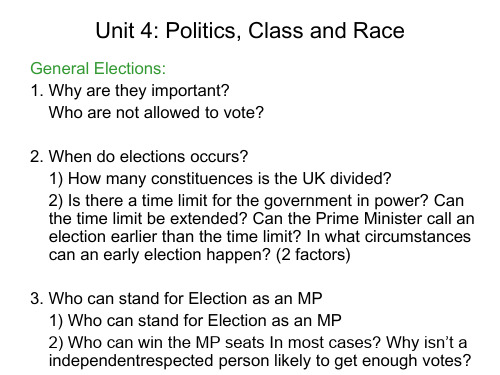
The UK Economy
3) Why are the years following the Second World War were problematic for the UK aviation industry? How to solve the problem? What is the first product produced collaboratively? 4) What is the most successful collaborative programme?
The UK Economy
1. Absolute Decline and Relative Decline 1) By which countries and when was the UK overtaken? 2) Why does the UK economy decline after 1945? 3) Why does the independence of India have great influence on the UK? 4) Do you think it is better that the British industry survived comparatively unaffected than that the industry of Germany and Japan were seriously damaged? 5) Why does the UK lack close relationship between industry and banks , as compared to the two most successful post-war economies, Japan and Germany, where banks and industrial firms have v
Unit Four Politics, Class and Race
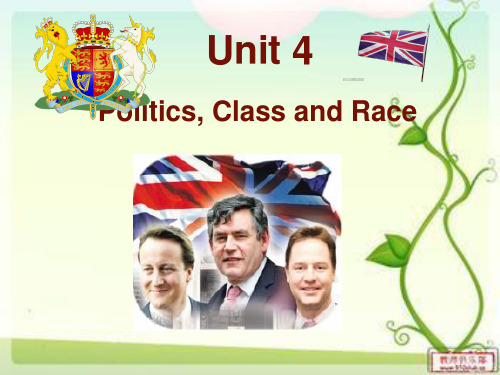
6. Electoral Machinery
1) Direct Suffrage(直接选举): 2) The Principle of Voluntary Ballot:自愿投票原则 Candidates and government organizations can campaign for votes (拉票)but they can’t put pressure on voters. 3) Uninominal district system(单名选区制/小选举区制) based on area and population; each constituency: only one parliamentarian; each voter: only one vote.
7. Procedure 1) The Queen dismisses the Parliament. 2) electoral register--voting cards 3) The Nomination of Candidates of each constituency 4) Set up campaign teams 5) Launching electoral campaigns
3) Residence Limits: Servicemen: live at least one months in a constituency. Other common voters: at least three months. So a lot of jobless people and seasonal workers lose the right to vote. 4) People of mental illness or being convicted prisoners have no rights to vote. 5) Register system. Local registrars visit from house to house and compile the electoral register(选民登记册) and then continuously check and revise it. 4. People Without the Right to Vote 1) Nobles/Aristocracy 2) Some certain categories of convicted crimes 3) Mental cent Prime Ministers from the left
(10.13)Politics Class and Race in the U.K 英国政治种族和等级介绍
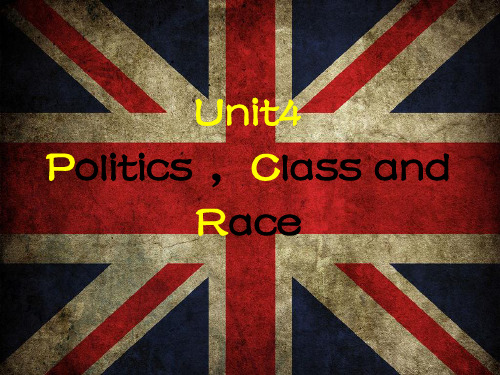
The Labour Party (工党) 2). The Conservative Party (保守党) 3). The Liberal Democrats (自由民主党)
1).
The first 2 main political parties dominate the politica尔和撒切尔夫人等著名首相并在20世纪80年代和90年代创下4次连续执政1979年1997年的业绩不过保守党自从于1997年大选败于布莱尔领导的工党以后它一直处于反对党的状态直成2010年同自由民主党组成联合政府重新上台执政
Unit4 Politics ,Class and Race
The Conservative Party
The Conservative party developed out of the Tory Party (托利党). Tory Party was founded in 1679 when Parliament divided into 2 political groups over the dispute whether James II should be the heir to King Charles II. The supporters of James II formed the group known as “ Tory”, while the opponents formed the “ Whig”. The Tory Party changed its name into the Conservative party and Whig into Liberal Party in 1833.
英美国家概括 判断正误 英国部分

英美国家概括判断正误The United Kingdom of Great Britain and Northern Ireland Unit 11.Britain is no longer an imperial(帝国) country. T2.The Commonwealth(共和国,民主国) of Nations includes all European countries. F3.1 in 10 of the British population are of non-European ethnicity(种族地位,种族特点). F4.The stereotype(陈规,刻板模式) of the English gentleman never applied(使适用) the majority of the British people. T5.Great Britain includes 3 constituent countries;England, Scotland, and Wales. T6.Northern Ireland is part of Great Britain. F7.When people outside the UK talk about England, they mistake it as Britain sometimes. T8.The Scots and Welsh have a strong sense of being British. F9.Scotland was never conquered by the Romans. T10.Most people in Scotland speak the old Celtic language, called “Gaelic”. F11.Scotland was unified with England through peaceful mean. T12.Wales is rich in coal deposits. T13.Cardiff, the capital of Wales, is a large city. F ?? largest14.The title of Prince of Wales is held by a Welsh according to tradition. F威尔士在1284年被英格兰合并,在爱德华一世征服了威尔士(1277年—1284年)的过程中,他按照威尔士人的要求:“一位在威尔士出生、不会讲英语、生下来第一句话说威尔士语的亲王”作为他们的领袖,爱德华一世将其即将分娩的王后接到威尔士,王子出生后即被封为威尔士亲王,以表示对威尔斯的重视并强化威尔士人的认同感,从此以后,英皇室便将皇储封为威尔士王子,皇子妃封为威尔士王妃,成为皇室继承法统规则之一。
英美国家概括 选择题 英国部分
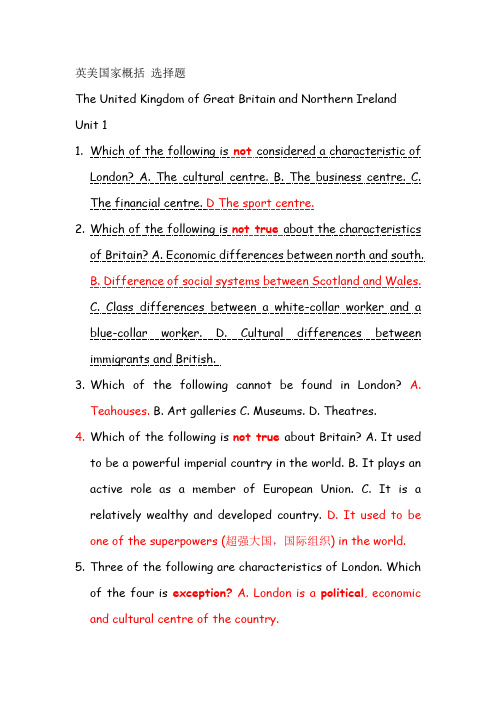
英美国家概括选择题The United Kingdom of Great Britain and Northern Ireland Unit 11.Which of the following is not considered a characteristic of London? A. The cultural centre. B. The business centre. C. The financial centre. D The sport centre.2.Which of the following is not true about the characteristics of Britain? A. Economic differences between north and south.B. Difference of social systems between Scotland and Wales.C. Class differences between a white-collar worker and a blue-collar worker.D. Cultural differences between immigrants and British.3.Which of the following cannot be found in London?A. Teahouses. B. Art galleries C. Museums. D. Theatres.4.Which of the following is not true about Britain? A. It used to be a powerful imperial country in the world. B. It plays an active role as a member of European Union. C. It is a relatively wealthy and developed country. D. It used to be one of the superpowers (超强大国,国际组织) in the world.5.Three of the following are characteristics of London. Which of the four is exception?A. London is a political, economic and cultural centre of the country.伦敦是四大世界级城市之一,与美国纽约、法国巴黎和日本东京并列。
英语国家社会与文化入门unit 4-5
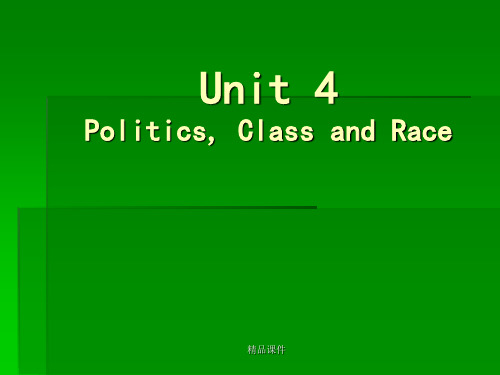
II. The current UK economy
精品课件
II. The current UK economy
精品课件
II. The current UK economy
精品课件
II. The current UK economy
精品课件
精品课件
I. Events in History
精品课件
II. The current UK economy
精品课件
II. The current UK economy
精品课件
II. The current UK economy
精品课件
II. The current UK economy
精品课件
▪ 4. what happens in an election
精品课件
I. General elections
精品课件
II. The policital Parties
▪ 1. The Labour Party
精品课件
II. The policital Parties
▪ 1. The Labour Party
精品课件
II. The policital Parties
▪ 1. The Labour Party
精品课件
II. The policital Parties
▪ 1. The Labour Party
精品课件
II. The policital Parties
▪ 2. The Conservative Party
Unit 4
Politics, Class and Race
精品课件
Key points
briunit4Politics,ClassandRace
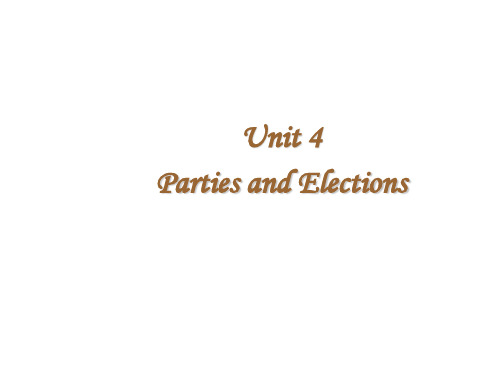
III. Elections
1. Features
A. A general election normally takes place every five years, which is largely dominated by the two major parties.
B. The whole of the UK is divided into 651 electoral districts, called constituencies.
H. Labour Party was formed by the trade unions, the Independent Labour Party and the Fabian Society in 1900. After 1922 the Labour Party gradually replaced the Liberal Party to be one of the two major parties in Britain.
3. History of the two-party system
A. The division into two parties grew out of the establishment of a Protestant Church of England in the 16th century.
Politics, class and race
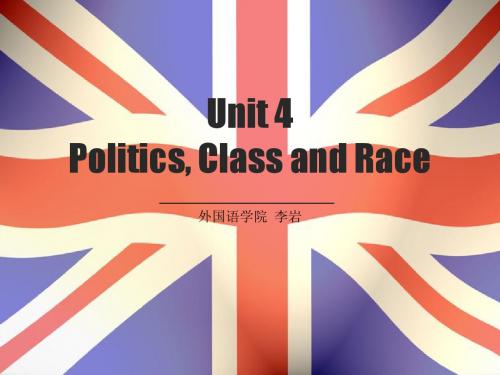
Party Electoral Broadcasts (PEB)
•Broadcasts made by the parties and
transmitted on TV or radio.
•By agreement with the broadcasters, each
party is allowed a certain number period to ―sell‖ their policies to the public.
•Gordon Brown (June 27, 2007)
•The 3rd biggest party •A party of the ―middle‖, occupying the
The Liberal Democrats
• •
ideological ground between the two main parties. Comparatively flexible and pragmatics in their balance of the individual and the social. Emphasizing the need to make government more democratic and accountable.
•
Hale Waihona Puke III. What happened in an election?
Everyone on the ―electoral register‖ will:
Receive a voting card
Go to the local voting station
Give a voting card to the official and get another card with the candidate’s name on it
- 1、下载文档前请自行甄别文档内容的完整性,平台不提供额外的编辑、内容补充、找答案等附加服务。
- 2、"仅部分预览"的文档,不可在线预览部分如存在完整性等问题,可反馈申请退款(可完整预览的文档不适用该条件!)。
- 3、如文档侵犯您的权益,请联系客服反馈,我们会尽快为您处理(人工客服工作时间:9:00-18:30)。
Race
Liverpool and Bristol 1981 Nationality Act South Asia and Caribbean countries Positive effects: Variety and interest—food and music Negative effects: attitude of white neighbours
Kyoto Protocol to the United Nations Framework Convention on Climate Change
1997, 2005-2012, 2012-2020
UN Climate Change conference in Copenhagen 2009
1970s Eward Heath 1970-1974 Conservative Harold Wilson 1974-1976 Labor James Callaghan 1976-1979 Labor 1980s Margret Thatcher 1979-1990 Conservative 1990s John Major 1990-1997 Conservative Tony Blair 1997-2007 Labor 2000s Gordon Brown 2007-2010 Labor 2010s David Cameron Conservative
Unit 4
Politics, Class and Race
General Elections The Political Parties Recent Political Trends UK Policy on Environmental Proteneral Elections
Why are They Important When Do Elections Occur? Who Can Stand for Election as an MP? What Happens in an Election?
Why are They Important
Household Energy Management Strategy 2010
Warm homes, greener homes Department of Energy and Climate Change
Class
Employment, income and cultural characteristics Life chances Blue-collar, white collar, grey collar Newspaper Education:public school comprehensive school Hereditary aristocracy Business and enterpreneurs life peers
Winter of Discontent 1978-1979
UK Policy on Environmental Protection
1997 Kyoto Protocol 京都议定书 2000 Climate Change Programme 2008 Climate Change Act 2009 Copenhagen UN Climate Change Conference UK Low Carbon Transition Plan Feb. 2010 PM Brown High Level Advisory Group on Climate Change Financing Mar. 2010 Household Energy Management Strategy
Small parties: the Party of Wales Big parties: Labor, Conservative and Democratic Liberal
What Happens in an Election?
Register on the electoral register(选民名册) Voting card Electoral campaigns:advertisements in newspapers, door-to-door campaigning, postal delivery of leaflets, party electoral broadcasts on TV Limit on campaign expenditure Majortiy 326 seats
The Political Parties
The Conservative Party—Tory The Labor Party at the end of the 19th century The Liberal Democratic Party—Whig
Recent Political Trends
1215 King John 1236 ealiest use of the word Parliament 1265 King Henry III and Simon de Montfort All Estates Parliament 1295 King Edward I Model Parliament 1407 King Henry IV money grant Commons Mar.-May 1640 Short Parliament 1640-1648 Long Parliament
1688 Glorious Revolution 1689 Bill of Rights 1832 Commons by popular election
When Do Elections Occur
5 years or less after the previous election usually (exceptions during WWI and WWII) Vote/Motion of no confidence 1979 James Callaghan vs. Margret Thatcher
Who Can Stand for Election as an MP
Anyone who is eligible to vote can stand as an MP. Plus 500 pounds of deposit No-hopers: Monster Raving Loony Party by David Sutch(1940-1999) in 1983
